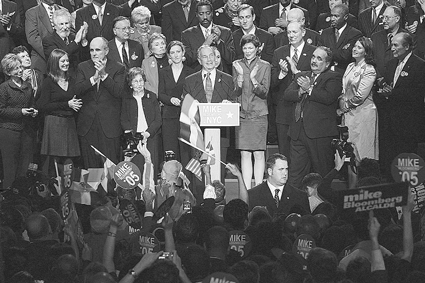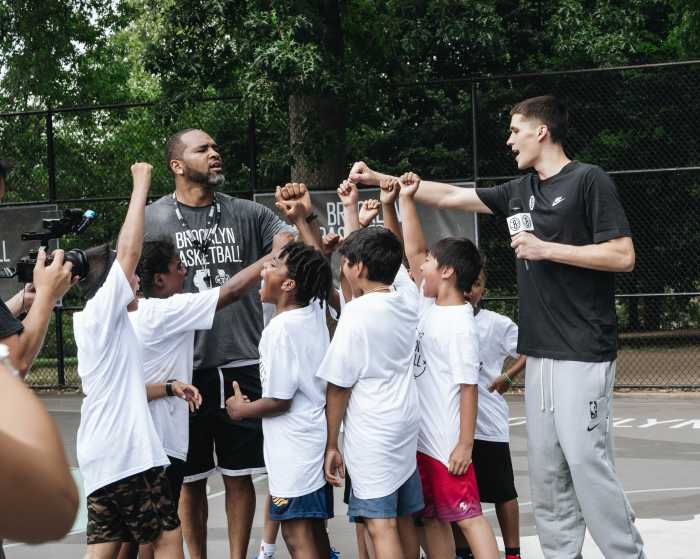Fast spending mayoral campaign spared no expense for a Midtown victory party
Standing before thousands of supporters in a midtown hotel ballroom and with dozens of prominent Democratic, Republican, and independent backers arrayed behind him, Mayor Michael R. Bloomberg ended his successful, multi-million dollar re-election campaign on an extravagant high note.
“I love this city,” Bloomberg said. “I give you my word that I will continue to lead it honestly and independently.”
The Republican mayor thanked Fernando Ferrer, the Democratic contender in the mayoral race, saying his challenger was “a good man and a worthy opponent” and adding, “I thank him for his commitment to the people of New York City.”
Bloomberg then recalled when he first took office four years ago just after the attacks of September 11, 2001.
“That night we told the world that New York City was alive and well,” he said. “We created jobs in every borough, we drove crime down to the lowest level in 40 years, we’re on the way to getting our children a quality education.”
Bloomberg, with 723,635 votes to Ferrer’s 477,903, took just under 60 percent of the vote to the Democrat’s tally that fell a bit below 40 percent, according to the Daily News. Roughly 200,000 fewer New Yorkers voted this year over four years ago. Just as his run was choreographed, the Bloomberg campaign, which at last report had spent $67 million through October 27, carefully staged the entire victory evening.
There were seven steps rising up on the stage behind Bloomberg, as opposed to a level dais, allowing the campaign to place more supporters there and making them more visible. The supporters, a mix of Latino, white, Asian Americans, and African Americans, were bracketed by a chorus of African-American and Latino women who sang “Ain’t No Stopping Us Now” before the mayor came on stage.
Bloomberg said his campaign was the “most diverse in history” and he claimed support from across ethnic and racial lines. Even “the house of labor,” or the union vote, had pitched in by bringing him the votes of “more than 600,000 working men and women,” the mayor said. The mayor claimed his campaign had 55,000 volunteers.
City Councilwoman Margarita Lopez, a Democrat and out lesbian, who in September lost her primary bid for Manhattan borough president, came on stage with Herman Badillo, a Democrat turned Republican and a Latino leader. Standing in the front row, Lopez waved to the crowd and gave two thumbs up to the audience. Brian Ellner, also a gay Democrat who backed Bloomberg after losing a bid for Manhattan borough president, was less visible in a rear row.
The crowd was less diverse politically than those on stage. When the three giant TV screens in the room showed U.S. Senator Jon Corzine, a Democrat, beating Doug Forrester, a Republican businessman, in the New Jersey governor’s race, the crowd booed and hissed, though there was a smattering of applause for that news. When Republicans Rudy Giuliani, the former mayor, and Governor George Pataki came on stage, they were greeted with rousing applause and cheers.
Other than the New Jersey race, those TV screens only went to local television broadcasts when they showed favorable results for Bloomberg, which inevitably brought cheers from the crowd, or when a reporter gave a report from the ballroom. Otherwise they showed pictures of the crowd captured live by cameras in the room.
When WNBC called the race for Bloomberg at 10 p.m., the crowd went wild. That was followed by more cheering moments later when NY 1 News proclaimed Bloomberg was the winner.
Ferrer’s concession speech, which began at roughly 10:30, was shown live on the screens, but without sound, and the Bloomberg campaign began moving the chorus and supporters onto the stage. The campaign waited to begin Bloomberg’s speech until just after 11:00 to avoid interrupting prime time TV entertainment programs and to ensure it would be carried live during local news broadcasts.
Bloomberg was introduced by Magic Johnson, the former basketball star, who asked the crowd “Are you ready for Mike Bloomberg the mayor who made New York City’s streets safer, the mayor who brought quality education to your children?”
In press reports, some Bloomberg supporters are describing the win as a mandate for the mayor, but, as always, the picture is more complex.
As much as some voters approve of the mayor’s performance, the lower turnout suggests there was a general disinterest in the race on the part of some voters, the view that a Bloomberg win was inevitable and that voting was pointless, or both.
With many in the mainstream press assuming a Bloomberg win, the coverage of the race was minimal and rarely dealt with issues taken up by the candidates. Bloomberg’s expensive campaign dominated the discourse and, just as the campaign’s closing night was an extravaganza, the final analysis may be that the 2005 mayoral race represents the triumph of salesmanship over substance.
gaycitynews.com



































